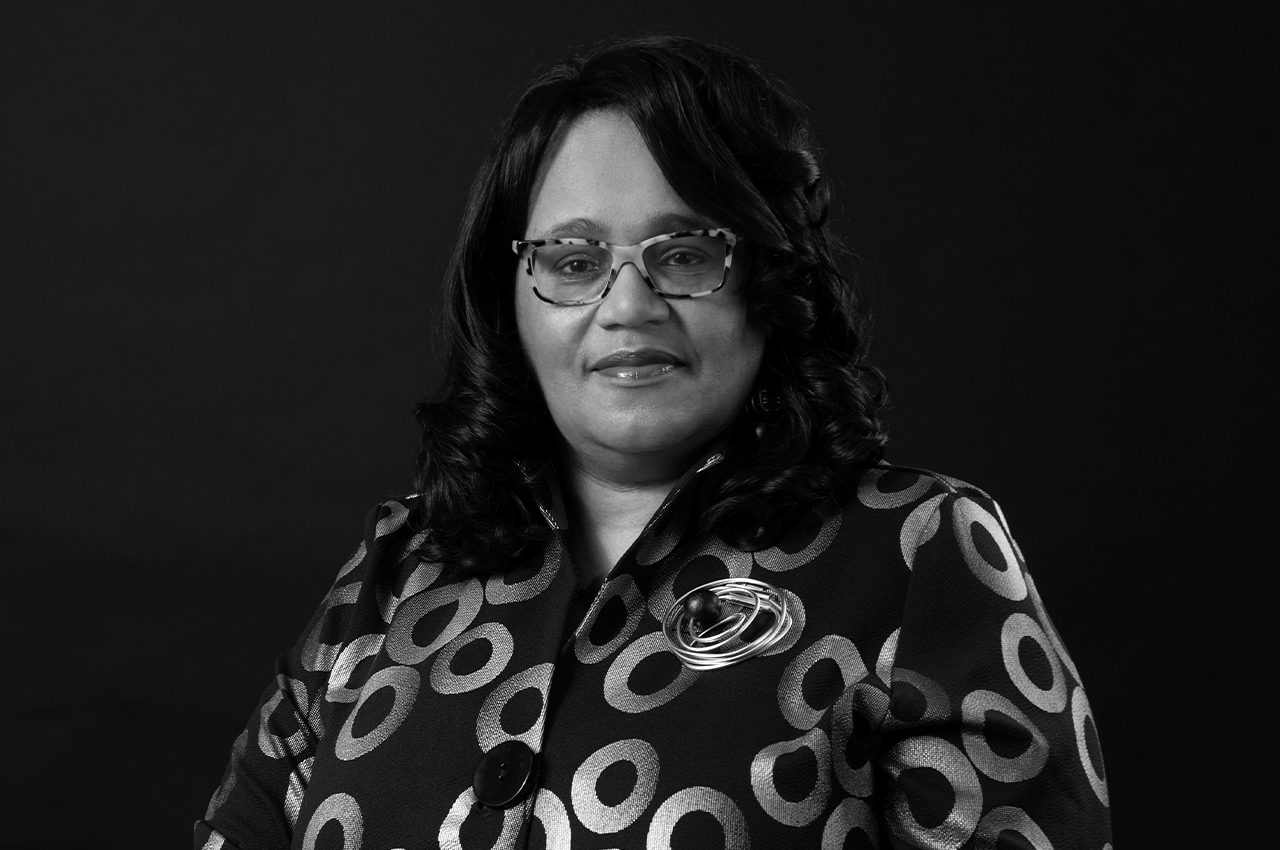By Renee Hardman as told to Christine Riccelli
Photographer: Duane Tinkey
Renee Hardman has volunteered with Big Brothers Big Sisters of Central Iowa since 1983 and was named CEO in 2018. Before joining the organization, she owned Hardman Consulting, a human resources management firm, and worked at Bankers Trust for 17 years, where she was senior vice president of human resources and later senior vice president of community relations. In 2017, she became the first Black woman elected to the West Des Moines City Council.
Over the years, the 59-year-old Hardman has served on the boards of some 20 nonprofits, including the Chrysalis Foundation, Dress for Success, the Latina Leadership Initiative, Character Counts in Iowa, and United Way of Central Iowa. She also is a trustee of Des Moines University and has served on the diversity committees at Drake University and the Greater Des Moines Partnership.
Hardman, who earned both a bachelor’s degree and an MBA from Drake University, has been recognized with numerous awards and honors from Drake, the Business Record, the Iowa Women’s Hall of Fame, the Greater Des Moines Leadership Institute, the NAACP and the YWCA, among other organizations and institutions.
In an interview condensed for publication, Hardman reflects on the importance of promoting understanding, staying true to yourself, and embracing the wisdom of your ancestors.
Embrace Educational Opportunity
I grew up in Maywood, Illinois, a suburb about 45 minutes west of Chicago. I have two sisters—I’m in the middle—and was raised in a single-parent home by a loving mother. My mom influenced me in a lot of ways. She worked long hours to support us and instilled in us the value of hard work and education. She knew that going beyond high school was critical to success. Whether we could afford college or not was a different issue, but whether or not to go was not negotiable.
I was accepted into a number of colleges in Illinois, but I landed upon Drake University and started there in 1979. I majored in psychology and had a job at Mainstream Living working with adults with mental illness. I never really thought I’d stay in Iowa—there wasn’t the diversity here compared to where I grew up in Chicago.
But I also knew that Des Moines offered opportunities that Chicago might not. I felt that my diversity might be more of a strength than a barrier. Maybe that was naive thinking, but I think that perspective has worked well for me on my journey. I remember telling friends that I was going to try to make a good living for myself here, take advantage of everything that the community had to offer, and make a difference.
I think Drake, predominantly a college of Caucasian students, prepared me for the journey I’ve had, where I’ve been the first or often times the only African American in boardrooms, on committees and in government organizations. Throughout my life, I’ve seen how Drake has helped me understand how to work with folks every day who look different than you while maintaining your own identity. Choosing Drake was one of the best decisions I’ve ever made.
Stay True to Who You Are
After Mainstream Living, I worked for the state of Iowa for about seven years as a personnel officer serving the Department of Agriculture and Land Stewardship and the Department of Revenue and Finance. I learned a lot there—everything from union negotiations to job audits.
One day at lunch with a mentor, I said, “At some point, I would like to see what corporate America has to offer,” and a few months later, she introduced me to the senior vice president of human resources at Bankers Trust. I joined the company as a recruiter, and about a year later, when the senior vice president moved on, the CEO asked me to head up human resources. I was the only African American female on the management team and executive committee the entire time.
One thing I am most proud of is that when I started, we were at about 3% to 4% racial diversity. When I left 17 years later, we were at 21%. My first boss led the charge on that, giving me a lot of latitude and challenging me to help move the needle.
Working in corporate America was a defining moment for me. Again, I go back to how Drake prepared me to be able to live in a world where you are the only one. And I think you do that by staying true to who you are. You do not compromise or suppress who you are because you are a minority. You look at it as an asset. You own who you are, and know you are there not as a token but to offer value and perspective that only you can offer. You share your voice, whether others are ready to hear it or not.
Draw on the Wisdom and Strength of Your Ancestors
In 2017, I ran for the West Des Moines City Council, the first African American woman in the city’s 125-year history to do so. One day when I was knocking on doors, an older Caucasian man answered the door, looked at me and said, “West Des Moines does not elect colored people.” He told me I was barking up the wrong tree.
I went back to my car and thought, “Are you sure you want to run for office here? This is ridiculous.” But then I began to reflect upon my ancestors, going way back to slavery, who would be so proud that my name was even listed on the ballot and who died fighting to have the right to vote. I reminded myself that I am standing on the shoulders of giants, those who paved the way and had to make enormous sacrifices for me to be able to knock on doors in West Des Moines and say, “I would like to talk to you about what is important to you about our city.”
I needed that jolt. It made me realize that the campaign wouldn’t be easy and that I needed to immerse myself in it, even if it was against all odds. That man had the courage to say what was on his mind, but I knew others wouldn’t have the courage to say anything but would just politely nod while thinking otherwise. I needed him to hit me over the head with a two-by-four to remind me of the history of where I come from and how strong of a people we are. I told myself, “I’ll show him. I’m going to work hard at this, regardless of what people think.”
One of the most emotional moments of my life was when I was sworn in. Cameras were everywhere, and City Hall overflowed with people watching history being made. My mother was in the audience, big tears in her eyes. I couldn’t look at her because I could see that she was emotional and proud as I was trying to say the oath.
She told a friend, “My baby made it. She has traveled many miles on her journey, but she has prevailed.” When you are raised by a single mom who sacrificed a lot and she looks at your life and realizes you’ve accomplished something like this, it’s a wonderful feeling.
Help Promote Understanding and Empathy
We’ve had many tough conversations on the council when racial and social equity conversations became heightened after the death of George Floyd. He wasn’t the first, but his death propelled African Americans to challenge once again, “When will enough be enough?”
We are saying to the world, “We will no longer be dismissed. We can’t continue to live life according to the standards of the most privileged.” So I think George Floyd’s legacy will be long-lived. There are still many miles to travel, but the tide is starting to move.
Still, I am exhausted. African Americans are exhausted. It’s exhausting dealing with systemic racism and realizing you will always have to be in the fight. A few months ago I was in my car driving and the tears just started flowing. I asked myself, “Why am I crying?” I think sometimes when you are relaxed, as I was driving that day, your body slows down enough to realize that you are carrying a heavy burden to help people understand the pain, to help them understand that we have systemic racism that continues to create barriers.
When I talk to my African American friends, I know we are in this fight together. We can’t give up on trying to bring about a heightened sense of equity and inclusion. So you dust yourself off and do some self-care, but you stay in the fight and do the work. You understand that we have a struggle going on and that our perspectives matter. You speak up and you speak out.
I may have been the first in a number of things I’ve done, but that’s not a badge of honor. It’s a better day when you can quit saying you are the first because that means others have followed you and it’s now just part of how we live our lives.
Get Out of Your Comfort Zone
While today I might look like a person who came here, sight unseen, in 1979 and made good on my life and hopefully have positively impacted the community, there have been tears along the way. I think sometimes when we look at successful women, we think it’s easy to get there. But it’s not.
I would like to help women and young people understand that while the journey is beautiful, it’s also rocky and requires a lot of fortitude. You are going to learn painful lessons along the way that will help you grow, but you have to get out of your comfort zone in order to do so. You can’t always play it safe. On my own journey, I’ve made calculated decisions, but I’ve also been open to taking detours as they’ve presented themselves.
I am a Christian, and I believe God knows what he wants us to do with our lives. There aren’t many decisions that I’ve made where I have not gotten on my knees and asked God for guidance, wisdom and strength.
Know You Are Enough
Big Brothers Big Sisters was my first civic engagement. Three days after I graduated from Drake, I became a Big Sister to a girl from Sierra Leone, and 38 years later, we’re still in contact.
I’ve had mentors all along my journey who’ve made such a big difference in my life. So I feel my life is coming full circle as I lead an organization that provides littles with mentors who help them reach their potential. I want to continue to amplify the work that we do and the meaningful impact we have on young people’s lives.
A year or two ago I was in Barnes and Noble and saw a children’s book called “I Am Enough” by Grace Byers. I took it off the shelf and I read it right there. It’s about the belief that no matter what your life experiences are or where you come from, you are enough—and that you can use that belief to carry you.
I intend to start an “I Am Enough” club with the littles at Big Brothers Big Sisters. After reading the book, we’re going to talk about the things that we can tell ourselves about being enough and what they can do when they are bullied and face life’s challenges.
It’s a wonderful message for adults, too, and it’s my mantra right now—that I am enough. I do not have to be anybody else. I am enough to do everything that I need to do and everything I want to do.











